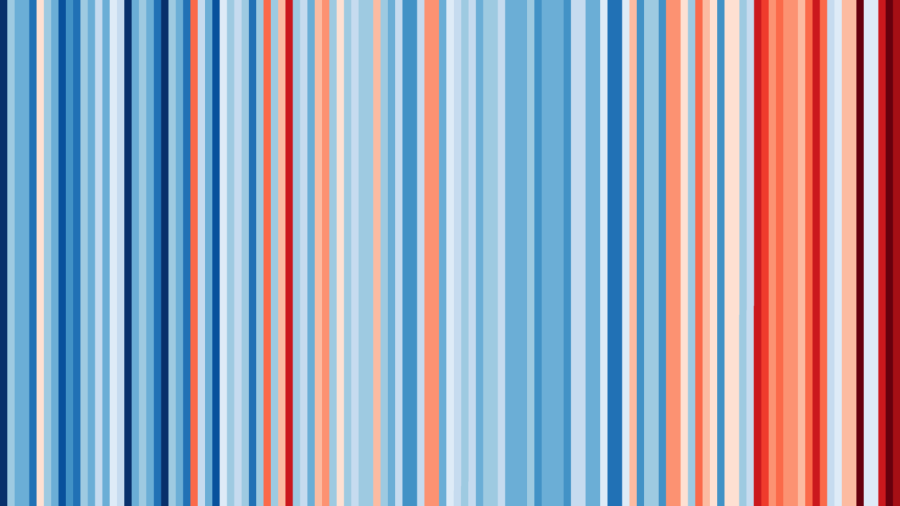The Undeniable Connection Between Human Rights and Climate Change
https://www.climate-lab-book.ac.uk/2018/warming-stripes/
This graphic shows the average temperature in America per year going back to the earliest recorded temperatures. This map goes back to the year 1895.
April 14, 2022
Human rights and climate change are often two topics that are not intertwined. Human rights, the undeniable freedoms that every living person possesses and deserves, do not seem to include the changing weather patterns and temperature. What people seem to forget is that these weather changes also impact the way of life for all human beings.
Many people think of climate change and visualize figures, like Greta Thunberg and the Green New Deal. People might think of melting ice caps and the political polarization that the term global warming has caused. But have you considered the rise in climate refugees, food shortages and degrading health due to pollution?
The United Nations Human Rights Office of the High Commissioner wrote an intriguing article, “The Impacts of Climate Change on the Effective Enjoyment of Human Rights” that also touches on the topics I have listed above. They state that “the negative impacts of climate change are disproportionately borne by persons and communities already in disadvantageous situations owing to geography, poverty, gender, age, disability, cultural or ethnic background, among others, that have historically contributed the least to greenhouse gas emissions.”
Historically, areas that are located closer to industrial areas where pollution is abundant are lower-income neighborhoods with a high population of minorities. These communities are more likely to face health issues due to contaminated water and air, as well as less access to quality food.
Developing countries, which contribute the least to pollution are also facing detrimental weather patterns that are forcing them to leave their home countries. Frequent disasters such as typhoons, hurricanes, flash flooding, rising sea levels, as well as droughts, make regions unlivable.
The nonprofit organization Climate Refugees states, “Across and within borders, people are displaced. Recent trends indicate more internal displacement due to climate-related disasters than conflict, where in fact, of the 30.6 million people displaced across 135 countries in 2017, 60 percent were as a direct result of disasters.”
While many news outlets and politicians say that this is a problem for the future, people are displaced from their homes and families every day due to the effects of climate change.
Changing weather patterns are not only causing more frequent and intense weather events, it is also changing the ability of crops to grow in their usual environment. The United Nations Academic Impact Article states, “Future projections in global yield trends of both maize and wheat indicate a significant decline; these declines can be attributed to the negative impacts of climate change arising from increasing greenhouse gas emissions.”
Many underdeveloped countries solely rely on these crops to sustain their bodies, with the changing weather patterns these countries will have to either scramble to find alternatives or flee their homes.
Along with these issues, human health as a whole is also under concern. Pollution can cause asthma, rising heat can cause heat-related death, loss of food can cause malnutrition and increased weather events can cause a rise in illnesses, such as the West Nile virus.
With all of these daunting events happening even as you read this article, one thing becomes clear. The only way to avoid making this already bad situation worse is large-scale action. It is so important that people cast their differences aside and work together to make a difference.
How You Can Help
It may seem inconsequential to do things such as recycle or take shorter showers after reading what was said above, but these actions are important and mean a lot more than one might think.
If everyone started recycling or decided to use solar power or stopped using single waste products, that way of life would diminish. If no one uses plastic, there is no profit, and production will diminish. People will begin to notice the change, governments might be compelled to pass more climate change-based legislation.
Here is a small list of household things you can do to combat climate change.
- Shop local
- Rely more on vegetables and fruits than meat
- Buy second hand
- Compost food and other waste
- Avoid single-use plastics
- Speak up about climate change
Sources Used
https://www.ohchr.org/en/climate-change/impacts-climate-change-effective-enjoyment-human-rights
https://www.climate-refugees.org/why
https://www.un.org/en/academic-impact/worlds-food-supply-made-insecure-climate-change



Keelie Maas • Apr 19, 2022 at 2:33 pm
Oliva,
I never thought of this! This is such an interesting take! Thank you for making us more aware of this problem.
Keep the great work up 🙂